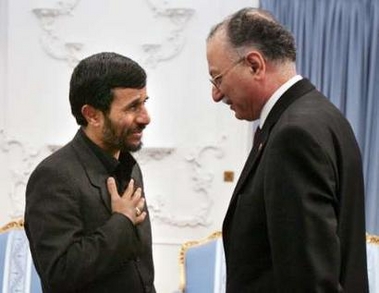A short statement issued by foreign ministers from the
six powers and the European Union did not mention economic sanctions, which the
U.S. wants and Iran has tried hard to avoid.

Iranian President Mahmoud Ahmadinejad (L)
greets Chief of the Organisation of the Islamic Conference (OIC)
Ekmeleddin Ihsanoglu in Tehran June 2, 2006.
[Reuters] |
The powers agreed privately, however, that Iran could face tough Security
Council sanctions if it failed to give up unranium enrichment and other disputed
nuclear activities, U.S. officials said.
U.S. Undersecretary of State Nicholas Burns called the meeting's outcome "a
step forward in our quest to deny Iran nuclear weapons capability."
The U.S. intelligence director, meanwhile said Tehran could reach that status
in as little as four years.
"This is a matter of assessment, we don't have a clear-cut knowledge,"
National Intelligence Director John Negroponte told British Broadcasting Corp.
"But the estimate we have made is that some time between beginning of the next
decade and the middle of the next decade they might be in a position to have a
nuclear weapon."
Diplomats feared Iran would reject any offer of talks if the threat of
sanctions was explicit, officials involved in the discussions said on condition
of anonymity because the seven-party negotiations were private.
The foreign ministers' statement threatens unspecified "further steps" in the
Security Council.
The group's statement contained no details of incentives Iran could be
offered. Diplomats previously have said the package includes help to develop
legitimate nuclear power plants and various economic benefits.
"We are prepared to resume negotiations should Iran resume suspension of all
enrichment-related and reprocessing activities," as previously required by the
U.N. nuclear watchdog agency, said British Foreign Secretary Margaret Beckett.
If Iran returns to the talks, "we would also suspend action in the Security
Council," Beckett said.
The Security Council, which can levy mandatory global sanctions and support
its mandates with military force, has been reviewing Iran's case for two months.
Its permanent, veto-holding members have been at odds over the possibility of
sanctions, with Russia and China opposed.
"At this crucial stage, it is very important that none
of the sides involved in the situation makes any sharp movements that would
create a threat to the real prospect of using the chance to reach agreement,"
ITAR-Tass quoted Russian Foreign Minister Sergey Lavrov as saying before talks
began in Vienna.